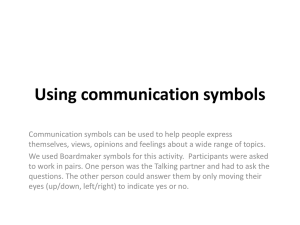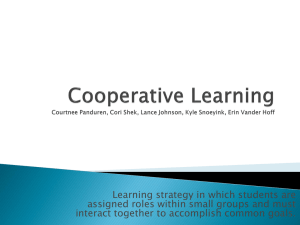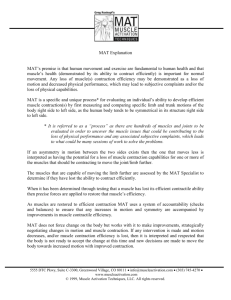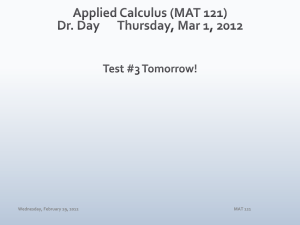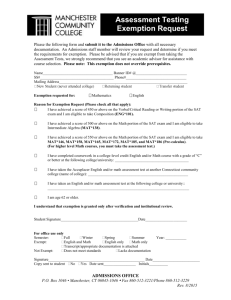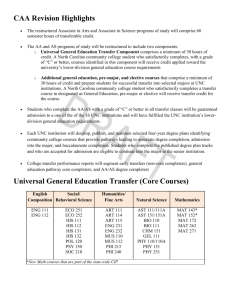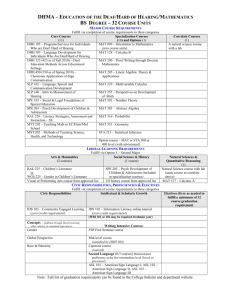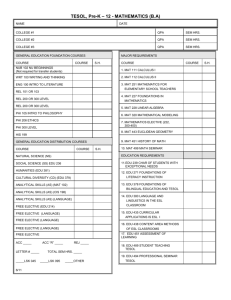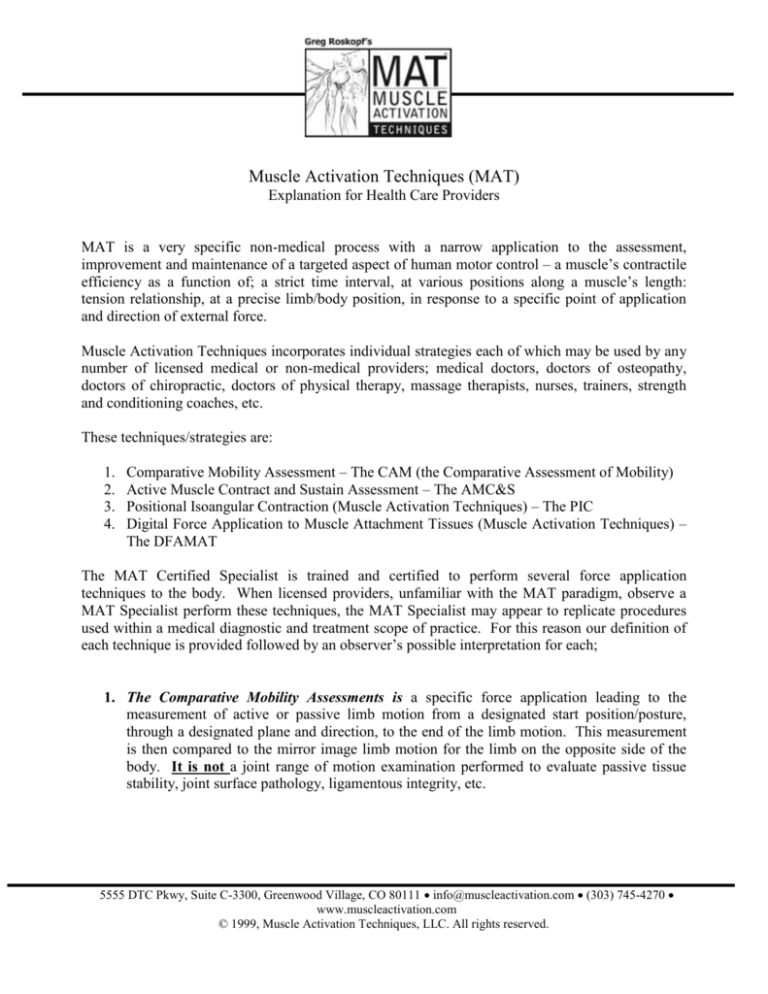
Muscle Activation Techniques (MAT)
Explanation for Health Care Providers
MAT is a very specific non-medical process with a narrow application to the assessment,
improvement and maintenance of a targeted aspect of human motor control – a muscle’s contractile
efficiency as a function of; a strict time interval, at various positions along a muscle’s length:
tension relationship, at a precise limb/body position, in response to a specific point of application
and direction of external force.
Muscle Activation Techniques incorporates individual strategies each of which may be used by any
number of licensed medical or non-medical providers; medical doctors, doctors of osteopathy,
doctors of chiropractic, doctors of physical therapy, massage therapists, nurses, trainers, strength
and conditioning coaches, etc.
These techniques/strategies are:
1.
2.
3.
4.
Comparative Mobility Assessment – The CAM (the Comparative Assessment of Mobility)
Active Muscle Contract and Sustain Assessment – The AMC&S
Positional Isoangular Contraction (Muscle Activation Techniques) – The PIC
Digital Force Application to Muscle Attachment Tissues (Muscle Activation Techniques) –
The DFAMAT
The MAT Certified Specialist is trained and certified to perform several force application
techniques to the body. When licensed providers, unfamiliar with the MAT paradigm, observe a
MAT Specialist perform these techniques, the MAT Specialist may appear to replicate procedures
used within a medical diagnostic and treatment scope of practice. For this reason our definition of
each technique is provided followed by an observer’s possible interpretation for each;
1. The Comparative Mobility Assessments is a specific force application leading to the
measurement of active or passive limb motion from a designated start position/posture,
through a designated plane and direction, to the end of the limb motion. This measurement
is then compared to the mirror image limb motion for the limb on the opposite side of the
body. It is not a joint range of motion examination performed to evaluate passive tissue
stability, joint surface pathology, ligamentous integrity, etc.
5555 DTC Pkwy, Suite C-3300, Greenwood Village, CO 80111 info@muscleactivation.com (303) 745-4270
www.muscleactivation.com
© 1999, Muscle Activation Techniques, LLC. All rights reserved.
2. The Active Muscle Contract and Sustain Assessment is a specific force application of a
specific magnitude and rate of force application, set-up and delivered by the MAT
Specialist, that assesses the muscle’s ability to react to and meet that force. It is not a
manual muscle “break” test or a manual muscle test used as an indication of a body’s
response to a chemical substance, nor a change in its energetic field, nor a positional post
relaxation technique.
3. The Positional Isoangular Contraction is a specific limb position/orientation and direction
of motion generated by the client, into a barrier to that motion, set-up and maintained by the
MAT Specialist. The MAT Specialist may use their hands and body to hold/guide limb
orientation/positions and provide the barriers to the motion during the isoangular
contraction. It is not Muscle Energy Techniques, strain/counter strain or post isometric
relaxation technique.
4. The DFAMAT is a specific force application to the body tissue using the practitioners’
fingers – direct pressure applied perpendicular to muscle attachment tissues (tendons,
aponeuroses) using the tips of the finger instituting motion creating subtle tension on the
attachment tissues, followed with motion lines that are perpendicular (cross hatching) to
each other, maintaining the tension for a duration of 1 – 4 seconds per site, releasing and
then reinitiating the process, moving along the width/length of the target muscle attachment.
It is neither a soft tissue evaluation nor a manipulation to release trigger points, adhesions,
Active Release Technique, move body fluids to and from tissue sites, etc.
The specific application and unique manner in which the DFMAT is executed is not any of
the following manual techniques which are taught in massage or other soft tissue
manipulation schools:
Effleurage
Tapotement
Longitudinal Stroking
Acupressure
Neuro-lymphatic
Trager
Myofascial Release
Trigger Point Therapy
Chair Massage
Goading
●
●
●
●
●
●
●
●
●
●
Petrissage
Cross Friction
Jostling
Craniosacral
Positional Release
Rolfing
Reiki
Sports Massage
Deep Tissue
Stripping
The intention of the MAT DFAMAT technique is never to evaluate and interpret the state of
soft tissues, nor to create a relaxation response for the muscle targeted. The MAT
DFAMAT intends to stimulate sensory receptors that in turn may increase motor
neuronal pool activation to the muscle associated with the attachment. This represents
the opposite effect that most, if not all, massage techniques are attempting to achieve as an
outcome of their techniques – which is relaxation.
5555 DTC Pkwy, Suite C3300, Greenwood Village, CO 80111 info@muscleactivation.com (303) 745-4270
www.muscleactivation.com
© 1999, Muscle Activation Techniques, LLC. All rights reserved.
MAT is clarifying and defending its use of these strategies as useful and appropriate for nonlicensed health and fitness professionals for the assessment and improvement of muscle
contractile capabilities related to exercise and physical performance. Furthermore, the
individual MAT strategies (previously noted) when used together in a systematic format,
under its definite methodology, based in the interpretation of the information gained from
each strategy, and the relationships established between that information, are unique to
MAT. MAT’s intention is not to diagnose or treat pathology but to improve a specific
aspect of a muscles contractile capabilities and that aspect’s impact on limb motion and
position maintenance as it relates to exercise and physical performance.
MAT assures that these strategies are not taught in a way that MAT Specialists interpret nor
perform them as medical procedures, or otherwise, and acknowledges the legal liability
position, as well as the authority of, established state licensed scopes of practice.
MAT is in no way attempting to usurp, undermine or assume the scope of practice of
licensed professionals with its techniques which in no way intend to be medical in nature.
A MAT practitioner specializes in improving the contractile characteristics of skeletal
muscle. With this in mind, MAT acknowledges, understands and appreciates…
1. …that the muscle system is often implicated in pathology and that MAT’s process
affects human physiology. Therefore MAT educates its specialists to seek to work
adjunctively and synergistically with licensed medical providers from all disciplines.
2. …that its certified specialists need to work with medical and wellness providers as
individuals seeking MAT often carry with them undiagnosed disease and conditions
that may be influenced by the MAT process..
3. …that the muscle systems’ improvements may not be advanced in the face of some
pathologies and therefore medical care must be sought to address those issues
limiting this advancement.
4. …that an individual with pain may experience a reduction, or even elimination of
that pain as a by-product of the MAT process. This only suggests that the pain had
its source within the loss of muscle system contractile efficiency. The MAT process
does not directly treat pain.
5. …a consumer’s reaction to the reduction or elimination of their pain, especially if
medical intervention has been utilized to relieve “pain” prior to the MAT process.
The reaction may be one where the consumer interprets that MAT “fixes” pain
problems. MAT educates its Specialist’s to address this issue by teaching them to
inform the consumer that its primary intention is to restore muscle contraction
efficiency and limb mobility and not to treat pain. MAT is no way attempts to
diminish the efficacy or efforts of medical providers to resolve their patients’
individual pain issue(s).
5555 DTC Pkwy, Suite C3300, Greenwood Village, CO 80111 info@muscleactivation.com (303) 745-4270
www.muscleactivation.com
© 1999, Muscle Activation Techniques, LLC. All rights reserved.
6. …that the MAT process may be learned and utilized by licensed providers in the
medical treatment of their patients, thus making the MAT process “Medical” only in
that context. Since MAT is taught primarily to non-licensed medical providers
(trainers, strength and conditioning coaches), the intention of the MAT process is not
to “diagnose” but to assess an individual’s muscular readiness for, and tolerance of,
participation in exercise and relatively strenuous physical activity.
7. …that many states, and the licensed professional regulated by a state, may have
language in their regulations defining the use of manual techniques where the
practitioner uses their hands in the application of treatments. MAT specifically
instructs its certified specialists to become familiar with their states’ regulations.
MAT also instructs its practitioners to stay within their skill set boundaries.
8. …the need to foster a deeper understanding and positive attitude toward the group of
diverse and highly qualified providers in their community, while being fully
cognizant of the legal and political significance of each group’s scope of practice in
the competitive inter-disciplinary health and fitness environment.
9. …that only licensed and authorized medical providers can utilize the ICD-10
designations for disease and CPT Codes for treatment of disease. MAT instructs its
specialists that they are never to use this system of coding to bill third party payers.
If a licensed provider working with third party payers chooses to hire a MAT
Specialist and bill that specialists’ skills under the authority of their license as a
treatment modality, then that is clearly the prerogative of that provider.
In closing, MAT encourages dynamic and collaborative working relationships in order to facilitate
the health and wellness of an individual. MAT seeks to demonstrate its efficacy and contribution to
individual health and for all health care and fitness providers, education providers to recognized the
importance of muscle contractile capability as viewed by the MAT paradigm.
MAT also wants to communicate that despite its narrow scope of practice - focusing on muscle
system contractile capabilities – this process and its outcomes should not be minimized nor their
potency overlooked or underestimated. MAT is an important process for anyone who recognizes
the significance of the muscular system for the maintenance and improvement of overall human
health and fitness. MAT believes its strategies are a unique and important contribution to the
general field of assessing and improving an individuals’ physical capabilities to engage and sustain
physical activity and improve human performance.
5555 DTC Pkwy, Suite C3300, Greenwood Village, CO 80111 info@muscleactivation.com (303) 745-4270
www.muscleactivation.com
© 1999, Muscle Activation Techniques, LLC. All rights reserved.
5555 DTC Pkwy, Suite C3300, Greenwood Village, CO 80111 info@muscleactivation.com (303) 745-4270
www.muscleactivation.com
© 1999, Muscle Activation Techniques, LLC. All rights reserved.

